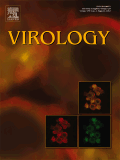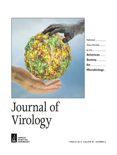
VIROLOGY
Scope & Guideline
Exploring the Frontiers of Viral Science
Introduction
Aims and Scopes
- Viral Pathogenesis and Immunology:
Research exploring how viruses cause disease, interact with host immune responses, and the mechanisms of viral evasion from host defenses. - Viral Genomics and Molecular Biology:
Studies involving the genetic characterization of viruses, their evolutionary dynamics, and the molecular mechanisms underlying viral replication and pathogenesis. - Vaccine Development and Therapeutics:
Investigations into the efficacy, safety, and mechanisms of vaccines against viral infections, as well as novel antiviral therapeutic strategies. - Epidemiology and Public Health:
Research examining the prevalence, transmission dynamics, and clinical outcomes of viral infections at population levels, including studies on emerging viral threats. - Diagnostic Innovations:
Development and evaluation of novel diagnostic tools and techniques for the detection and monitoring of viral infections.
Trending and Emerging
- COVID-19 Research:
A significant trend in recent publications is the focus on various aspects of COVID-19, including vaccine efficacy, viral load monitoring, and long-term effects, driven by the pandemic's global impact. - MicroRNA and Viral Interactions:
Emerging interest in the role of noncoding RNAs, particularly microRNAs, in the regulation of viral infections and their potential as biomarkers or therapeutic targets. - Viral Co-Infections and Comorbidities:
An increasing number of studies are investigating the implications of co-infections with multiple viruses and their effects on patient outcomes, particularly in immunocompromised populations. - Advancements in Genomic Techniques:
Recent publications highlight the use of next-generation sequencing and other advanced genomic techniques to study viral diversity and evolution, reflecting the rapid technological advancements in the field. - Global Viral Epidemiology:
There is a growing trend towards understanding the global distribution and epidemiological patterns of viral infections, emphasizing the need for surveillance in a post-pandemic world.
Declining or Waning
- Traditional Diagnostic Techniques:
There appears to be a waning interest in conventional diagnostic methods as newer, more rapid techniques like PCR and next-generation sequencing gain prominence. - Viral Diseases with Decreasing Incidence:
Research on certain viral diseases that have become less prevalent, such as specific endemic viruses, may be receiving reduced attention in favor of more urgent global health threats. - Animal Virology Studies:
While still relevant, there has been a noticeable decrease in publications focused exclusively on veterinary virology, possibly overshadowed by human health concerns.
Similar Journals

VIRUS GENES
Decoding the Language of VirusesVIRUS GENES is an esteemed journal published by Springer, dedicated to advancing our understanding of virology and its related fields, including genetics, molecular biology, and immunology. With a publication history that spans from 1987 to 2024, this journal provides researchers and professionals with a platform to disseminate high-quality, peer-reviewed articles that explore the intricacies of viral genetics and their implications in health and disease. With an impact factor placing it in the Q3 quartile across multiple categories in 2023, including Genetics and Virology, VIRUS GENES serves as a crucial resource for academics seeking to stay at the forefront of viral research. Its commitment to showcasing innovative research makes it an invaluable asset for students and professionals aiming to deepen their knowledge in the rapidly evolving landscape of virology. Although currently not offering Open Access, the journal ensures wide accessibility through institutional subscriptions, thereby playing a vital role in the collaboration between scientists globally.

Journal of Clinical Virology Plus
Transforming clinical virology through open-access research.The Journal of Clinical Virology Plus, published by Elsevier, is an essential resource for researchers and professionals in the fields of virology and infectious diseases. Launched in 2021, this journal aims to bridge the gap between clinical research and application, fostering a deeper understanding of viral pathogenesis, diagnostics, and therapeutic strategies. With an ISSN of 2667-0380, this open-access journal brings cutting-edge findings to the global scientific community, facilitating the rapid dissemination of knowledge critical for advancing public health. Positioned in the Q3 category for both Infectious Diseases and Virology in 2023, its ranking reflects its growing influence and relevance in the academic landscape. The journal strives to support innovative research, collaborative studies, and comprehensive reviews that address contemporary challenges in clinical virology. As it converges through the years from 2021 to 2024, Journal of Clinical Virology Plus aims to be a central hub for vital discussions and breakthroughs in this dynamic field.

Viruses-Basel
Disseminating Critical Findings in Infectious DiseasesViruses-Basel, published by MDPI, is a leading interdisciplinary journal focused on the field of virology and infectious diseases, offering a platform for the rapid dissemination of high-quality research. Established in 2009, this open access journal has become an essential resource for researchers and health professionals, ensuring that critical findings are readily available to a global audience. With an impressive Q1 ranking in Infectious Diseases and a Q2 ranking in Virology as of 2023, the journal reflects its commitment to impactful research, validated by its notable positions within Scopus categories—ranked #84 out of 344 in Medicine: Infectious Diseases and #27 out of 80 in Immunology and Microbiology: Virology. The journal adheres to high standards of academic rigor, and by embracing an open access model, it promotes unrestricted access to scientific knowledge, fostering collaboration among researchers, professionals, and students alike. Situated in Basel, Switzerland, the journal serves as a cornerstone in the dissemination of research findings related to viral diseases and their implications on public health.

Advances in Virology
Shaping the Future of Infectious Disease ResearchAdvances in Virology, an esteemed journal published by HINDAWI LTD, serves as a pivotal platform for cutting-edge research in the field of virology and infectious diseases. With its ISSN 1687-8639 and E-ISSN 1687-8647, the journal has been a significant contributor to the scientific community since its initiation as an Open Access resource in 2009, allowing researchers from around the globe to access groundbreaking findings without barriers. Operating out of the United States and recognized for its commitment to high-quality research, the journal's relevance is underscored by its ranking in the Q3 category for Infectious Diseases and Q4 for Virology as of 2023. The time frame of publications spans from 2009 to 2024, reflecting a continuous commitment to exploring the evolving landscape of virology. This journal not only promotes the dissemination of novel insights and methodologies but also fosters collaboration and innovation within the scientific community, making it an invaluable resource for researchers, professionals, and students alike.

Retrovirology
Championing Open Access for Groundbreaking FindingsRetrovirology is a prominent open-access journal published by BMC since 2004, dedicated to the field of retroviral research. With a strong focus on advancing knowledge in both infectious diseases and virology, this interdisciplinary journal has achieved a commendable ranking of Q2 in its respective categories as of 2023, reflecting its significant contribution to the scientific community. Hosted in the United Kingdom, Retrovirology serves a global audience of researchers, professionals, and students, making vital research accessible to all without barriers. The journal's emphasis on high-quality peer-reviewed articles supports the dissemination of groundbreaking findings that could shape the future of virology and related fields. With an impressive Scopus ranking, including a percentile of 65th in Medicine: Infectious Diseases, it stands out as a valuable resource for those committed to understanding and combating viral diseases. Retrovirology continues to be an essential platform for innovative research, with its open-access model ensuring that transformational science reaches the widest possible audience.

VIROLOGICA SINICA
Driving the Future of Viral Research and UnderstandingVIROLOGICA SINICA, published by KEAI PUBLISHING LTD, is a leading international journal dedicated to the field of virology. With an ISSN of 1674-0769 and E-ISSN of 1995-820X, this esteemed journal showcases cutting-edge research from 2006 to 2024, focusing on critical developments in Immunology, Infectious Diseases, Molecular Medicine, and Virology. As evidenced by its respectable positioning in the Q2 quartile of relevant categories and impressive Scopus rankings—such as Rank #20/80 in Virology—VIROLOGICA SINICA serves as an essential resource for researchers, professionals, and students aiming to deepen their understanding of viral pathogens and their impact on human health. While the journal does not currently offer open access, it remains an invaluable publication for those seeking to stay at the forefront of virology research. Its address is located at 16 Donghuangchenggen North St, Beijing, China, where it continues to foster academic excellence in the rapidly evolving landscape of virology.

ANTIVIRAL RESEARCH
Exploring Breakthroughs in Virology and PharmacologyANTIVIRAL RESEARCH, published by Elsevier, stands at the forefront of the study of antiviral agents and therapy, with a dedicated focus on advancing the understanding of viral infections and their mechanisms. The journal is recognized within the top tier of academic publications, belonging to the prestigious Q1 category in both Pharmacology and Virology as of 2023, ranking 12th out of 313 in Pharmacology and 11th out of 80 in Virology according to Scopus metrics, reflecting its significant impact in the field. With a long-standing history since its inception in 1959, it continues to serve as an essential platform for researchers and health professionals alike, sharing critical findings that drive innovation in antiviral therapeutics. Although it does not currently offer open access options, the journal’s rigorous peer-review process ensures that every published article meets high academic standards, providing invaluable insights for those dedicated to enhancing public health through virology research.

VIRAL IMMUNOLOGY
Connecting cutting-edge research with clinical practices in viral immunology.Viral Immunology, published by Mary Ann Liebert, Inc, stands as a prominent journal dedicated to advancing the understanding of the interplay between viral infections and host immune responses. With a strong focus on immunology, molecular medicine, and virology, the journal provides a platform for the dissemination of high-quality research findings and innovative methodologies that could shape the future of these critical fields. Although it currently holds a Q3 rating across its relevant categories and a respectable ranking within the Scopus database, Viral Immunology continues to strive for excellence with a commitment to publishing influential research that informs both academic and clinical practices. The journal accepts submissions in various formats—original research, reviews, and commentaries—catering to a diverse readership that includes researchers, professionals, and students engaged in the biological and medical sciences. Readers can anticipate insightful articles that address urgent challenges in immunological responses to viral infections, paving the way for new therapeutic strategies and public health initiatives.

Journal of Virology
Exploring the Frontiers of Viral ResearchJournal of Virology is a premier scholarly journal dedicated to advancing the field of virology, focusing on the molecular mechanisms of virus-host interactions, viral pathogenesis, and the latest therapeutic and vaccine developments. Published by the American Society for Microbiology, this esteemed journal has been a cornerstone for researchers since its inception in 1967, providing a platform for high-quality, peer-reviewed research. With a commendable impact factor indicative of its relevance and influence, the journal is categorized in the top quartile (Q1) for Virology, Microbiology, and Insect Science, reflecting its significance in these fields. Researchers can access a wealth of studies and findings that shape our understanding of viruses and their interactions with hosts, highlighting its role in both basic and applied sciences. Positioned in the United States, the Journal of Virology serves a global audience, ensuring that cutting-edge discoveries reach professionals, students, and academics alike. Join the conversation as we explore the complexities of virology and its implications for human health and disease.

ARCHIVES OF VIROLOGY
Elevating the discourse on viral health impacts.Archives of Virology is a prestigious academic journal dedicated to the field of virology, published by Springer Wien. Established in 1975, this journal has been a crucial platform for disseminating innovative research findings and advancements in the understanding of viral diseases and their impact on human health. It holds a notable position in the academic landscape, with a 2023 impact factor placing it in Q2 within the field of Medicine (miscellaneous) and Q3 in Virology. Its Scopus ranking within the Virology category further underscores its relevance, with a notable percentile of 45th. Although it does not provide Open Access options, the journal's rigorous peer-review process ensures the highest quality of published work, making it an essential resource for researchers, professionals, and students aiming to stay updated in the rapidly evolving field of virology. For those committed to advancing their understanding of viruses and viral diseases, Archives of Virology is a vital scholarly resource.